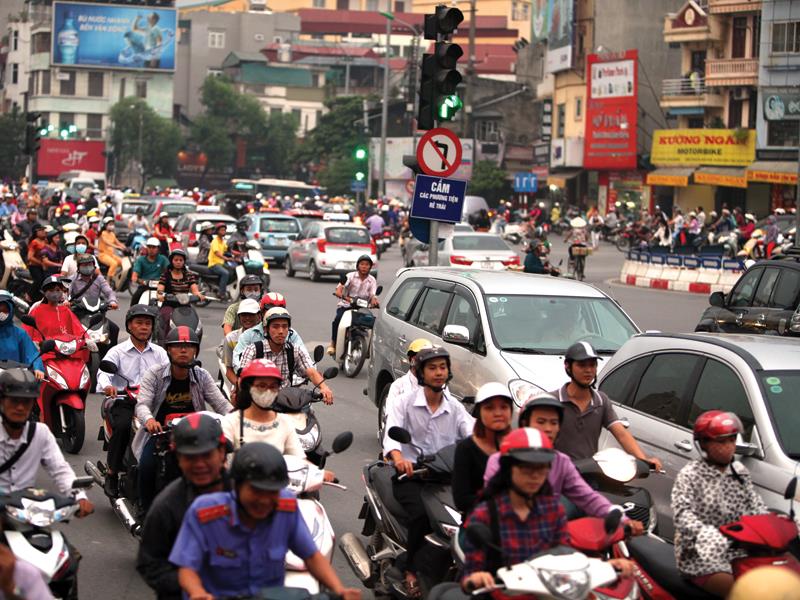VAMM reported rising sales in first half of 2017
 |
| VAMM reported rising sales against the backdrop of Hanoi authorities considering restricting transportation in inner city districts |
| RELATED CONTENTS: | |
| HN motorbike ban by 2030 | |
| Hà Nội concocts scheme to take your motorbike | |
| Six million vehicles, nowhere to put them | |
VAMM, which includes five members, namely Honda Vietnam Co., Ltd., Piaggio Vietnam Co., Ltd., Vietnam Suzuki Corporation, SYM Vietnam Company, and Yamaha Motor Vietnam Co., Ltd., has announced its accumulated sales volume for the first six months of 2017. According to the report, VAMM sold 1,527,288 units, an increase of 6 per cent in comparison to the same period of 2016.
In the fiscal year 2017 (from April 1, 2016 to March 31, 2017), the number of motorbikes sold in Vietnam was about 3.14 million units, an increase of 8 per cent compared to the last fiscal year. Of the total, Honda Vietnam sold about 2.17 million units, an equivalent of 69.3 per cent of the market share.
Starting from the third quarter of 2017, VAMM will release sales reports four times a year, instead of twice a year as it previously used to. The next report will be in October this year. This accumulated sales data is seen as the sell-out volume of all five VAMM members at the Vietnamese market, and it does not represent production volume or include export volume.
Currently, these five VAMM members have been providing the local Vietnam market with a wide range of products, including cubs, scooters, and clutch types.
At present, Hanoi and Ho Chi Minh City are the two biggest markets for motorbikes, especially the expensive brands. However, recently, Hanoi authorities have passed a regulation on gradually restricting the number of motorbikes in the inner districts, and this regulation is forecasted to significantly influence motorbike manufacturers.
| On July 4, 2017, the Hanoi People’s Council passed the resolution on strengthening the administration of means of transport to ease traffic jams and pollution in Hanoi during the period of 2017-2020, with vision to 2030. The resolution was passed with 91 per cent of votes in favour. The resolution, which includes the gradual ban on motorbikes by 2030 in inner Hanoi, will be implemented in three phases. In the first phase from 2017 to 2018, Hanoi will review all personal vehicles and put them under a coordinated management plan. In the second phase from 2017 to 2020, Hanoi will focus on developing multimodal public transportation to serve the demands of 50-55 per cent of citizens in the inner city by 2030. In the third phase from 2017 to 2030, the use of motorbikes in some areas of the city will be gradually limited, and motorbikes will be completely banned from the inner districts by 2030. |
What the stars mean:
★ Poor ★ ★ Promising ★★★ Good ★★★★ Very good ★★★★★ Exceptional
Latest News
More News
- NAB Innovation Centre underscores Vietnam’s appeal for tech investment (January 30, 2026 | 11:16)
- Vietnam moves towards market-based fuel management with E10 rollout (January 30, 2026 | 11:10)
- Vietnam startup funding enters a period of capital reset (January 30, 2026 | 11:06)
- Vietnam strengthens public debt management with World Bank and IMF (January 30, 2026 | 11:00)
- PM inspects APEC 2027 project progress in An Giang province (January 29, 2026 | 09:00)
- Vietnam among the world’s top 15 trading nations (January 28, 2026 | 17:12)
- Vietnam accelerates preparations for arbitration centre linked to new financial hub (January 28, 2026 | 17:09)
- Vietnam's IPO market on recovery trajectory (January 28, 2026 | 17:04)
- Digital economy takes centre stage in Vietnam’s new growth model (January 28, 2026 | 11:43)
- EU Council president to visit Vietnam amid partnership upgrade (January 28, 2026 | 11:00)
















 Mobile Version
Mobile Version